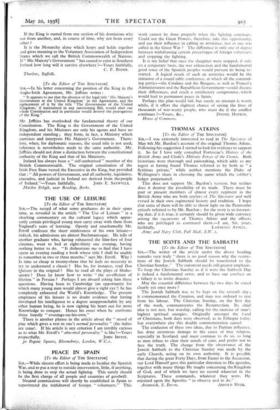THE USE OF LEISURE
[To the Editor of THE SPECTATOR] SIR,—The reco,&d of what some graduates do in their spare time, as revealed in the article " The Use of Leisure " is a
shocking commentary on the cultural legacy which appar- ently certain privileged young men carry away with them from England's seats of learning. Openly and unashamedly Mr.
Erroll confesses the sheer aimlessness of his own leisure—
indeed, his admissions are almost Buchmanesque. He tells of another graduate who, having exhausted the film-fare of four
cinemas, went to bed at eight-thirty one evening, having nothing better to do. " It disheartens me to find that I have spent an evening reading a book whose title I shall be unable to remember in two or three months," says Mr. Erroll. Why ? Is time so cheap at twenty-three that he feels no necessity to try to understand a classic ? Has he, for instance, read Don Quixote in the original•? Has he read all the plays of Shake- speare ? Does he know how to write " the co-efficient of friction " in Persian ? Perhaps I am absurd asking him these questions. Having been to Cambridge (an opportunity for which many young men would almost give a right eye !) he has
completely exhausted the World's Knowledge. The present emptiness of his leisure is no doubt evidence that having
developed his intelligence to a degree unapproachable by any other human being, he is now sighing his heart out for more Knowledge to conquer. Hence his ennui when he confronts those beastly " evenings-on-his-own."
There is another phrase in the article about the " mood of play which gives a rest to one's normal personality" (the italics are mine). If his article is any criterion I am terribly curious as to what Mr. Erroll's "abncrmal personality" is like !—Yours


















































 Previous page
Previous page